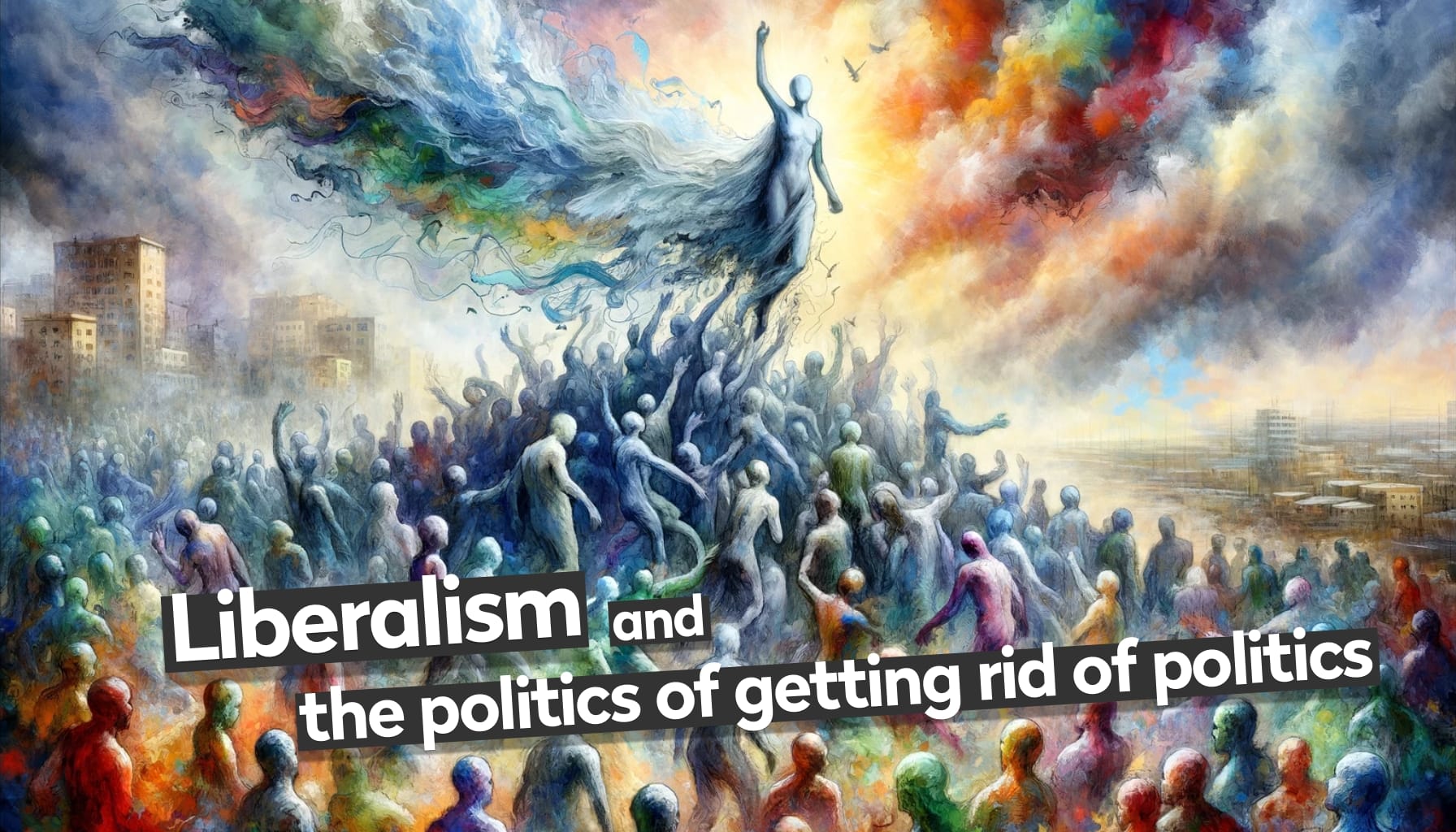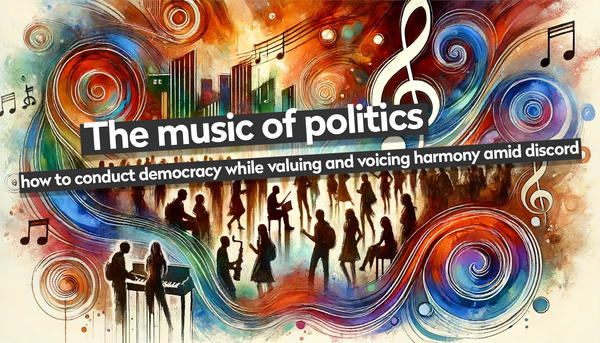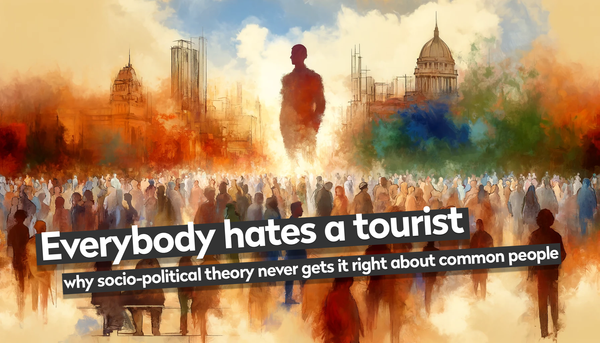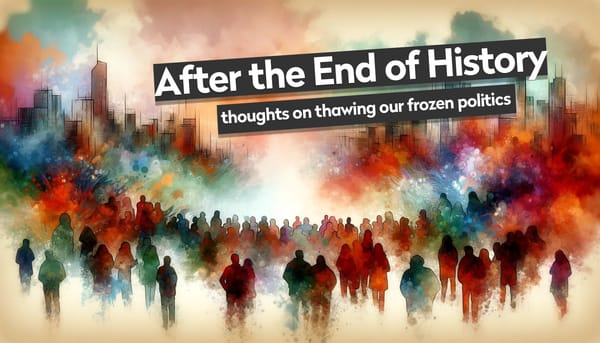Overall, the essay series serves as a call to reimagine our politics to address contemporary challenges by reviving the foundational questions of political life, aiming to reinvigorate public discourse with moral and ethical considerations about the societies we aspire to create.
Who will rid me of this turbulent history?
Last time, we began our exploration of how to mend our broken politics by considering the origins of the once-fashionable view of liberal democracy as the ultimate political destination, the so-called 'end of history'.
Even if we take democracy for granted as the best and final form of government, we risk forgetting that ‘democracy’ can take many forms and has had a varied and turbulent history.
Though we may understand the essence of democracy as self-government by the people each in roughly equal measure, there is no fixed interpretation of what exactly this means, nor can we assume that everyone will think this is a good idea.
The democracy of Athens, conducted by assembly in which ‘the people’ voted directly on issues that affected them, is markedly different from the style of democracy we are more accustomed to in which decisions of public policy are taken by representatives, and where the democratic component consists largely in selecting those representatives. This is not to dwell on the institutional and procedural differences in ‘democracy’ for example between Washington and Westminster; the effects of different voting systems such as first-past-the-post, the alternate vote and proportional representation; or to pay heed to the differing character of large democracies in India and Indonesia.
Just who ‘the people’ are is also a matter for interpretation — women, slaves, people without property and children for example have all been or are excluded from some ‘democracies’, while rulings of the US Supreme Court that count money as free speech suggest that in some democracies, corporations can be people too.
Democracy’s different forms are a reflection and a product of the politics of different places and times. Even when a particular form seems settled, interpretation of its key ideas is still necessary, as John Keane reminds us in The Life and Death of Democracy.
For example, ‘representative’ democracy has prevailed over ‘assembly’ democracy in more recent times arguably because it makes concessions to the restraints placed on the practice of public administration by the time- commitments of citizens, their expertise and their sheer number. Instead of direct participation, citizens elect someone to represent them in such matters, expressing the idea of making present something which isn't — in this case, the wishes of the citizenry.[1]
But just what is such a 'representative' to do, exactly?
As Keane puts it, should they act as a delegate, expressing the people's wishes regardless of their own opinion? Are they elected instead to use their own judgment and discretion? Or is the proper role of a representative to vote as a voice in concert with the party they belong to? In practice we find endless examples that indicate all three approaches are being taken at once.[2]
Our modern societies have become much larger, faster and more complex, outpacing the old institutional arrangements of representative democracy we have relied on since the 19th century.
One characteristic change has been the growth of more and more quasi-government or non-government institutions that exist to keep traditional government institutions accountable – watchdogs, oversight committees, independent commissions and the like, as well as more informal examples such as certain non-government organisations (NGOs), social activism groups and even specialist media outlets.
These have the effect of displacing the traditional decision-making authority of government and diffusing it so that everyone is keeping an eye on everyone else. Keane calls this ‘monitory democracy’ and says we are still figuring out how to make it work for us.[3]
Similarly, there has been a lot of attention directed to the ‘democratic deficit’ in the procedural processes of complex political institutions, especially supra-national bodies such as the European Union and United Nations.
Whatever kind of arrangements we might have in mind when we think of democracy, Keane also reminds us that ‘liberal’ democracy has not always enjoyed support, even among liberals.
If we now understand liberal democracy to be ‘the unity of private and public interests, the triumph of the state over the freedoms of civil society’, then this is precisely what bothered Hegel and Tocqueville about it.
Liberal democracy was objected to by some intellectuals as ‘oxymoronic’; ‘unconstitutional’ because ‘its belief in a sovereign people violates the separation of ... powers’; ‘a fraud because it sold short “the people”’; ‘dysfunctional’; that it ‘tends towards lawlessness’; ‘a mask for class exploitation’; ‘an illusion fed by servility’; 'no match for an expert-run bureaucracy'; or (with some prescience) ‘a recipe for a new type of despotism run by political parties, elected politicians and governments.’[4]
We should be neither surprised nor dismayed at this range of contradictory opinions, then or now — their existence simply reminds us that all forms of life are contingent and not a fait accompli of history or logical necessity.
Ordinary politics cannot be avoided — if progress can be made, it can just as easily be lost.
Ordinary politics cannot be avoided — if progress can be made, it can just as easily be lost.
If order and stability seems to demand some consensus on basic social arrangements (and we would be incautious to assume such a unified consensus ever really exists), then the moment in which such social arrangements are decided, however broadly, must nonetheless be an act of political will.
But whose act is it, exactly?
Liberals are often uncomfortable with this question. Liberalism is a doctrine that seeks to emancipate humanity from arbitrary power and instead establish a vision for society on the authority of individual human reason.
Instead of giving obedience to a supposedly divinely-appointed sovereign, liberalism tells us we are sovereign in ourselves.
However, as liberalism would have it, we agree to bind ourselves together in a social contract because we use our reason to understand that this arrangement is better for all of us individually.
This is how we find Kant, perhaps with an eye to his professional position in 18th-century Prussia, hedging his bets somewhat by asserting individual sovereignty on the one hand but evincing a duty to serve the institutions and elite to which we are bound.
Liberalism concedes that we need a government to manage our affairs collectively, but wants us to know that any such government can govern only with our consent, and that any government too, like all of us, has its power subject to the rule of law.
Therefore, as David Dyzenhaus notes, ‘according to rule-of-law liberalism, power resides in the legal system itself and not in any personal authority representing the state.’[5] This is what makes Rousseau free to say that in liberal societies ‘the general will’ replaces the divine will as previously expressed through the sovereign monarch, or Tocqueville that ‘the voice of the people is the voice of God’.[6]
But this is a dodge.
The power to decide the basic arrangements that will heretoforth constitute a political order — that is, ‘constituent power’ — is an exceptional, sovereign power, as pointed out by Carl Schmitt.[7]
Liberals, uncomfortable with the idea that sovereignty could reside in a particular individual, have diffused it among ‘the people’, but Schmitt says there is always a sovereign, and such diffusion only masks where sovereignty really lies.
Exceptional circumstances, such as states of emergency and constituent power, bring the issue of sovereignty to the fore, and for Schmitt the question of who has it is a simple one — sovereign is ‘he who decides.’[8]
Schmitt was highly critical of liberal democracy as a political philosophy, worried that it would be ultimately self-defeating. Eventually to become a Nazi legal theorist, Schmitt advocated instead a ‘mass democracy’ that would endorse a sovereign dictator. But we need not follow Schmitt to his conclusions to find value in his critique of liberal democracy. Dyzenhaus summarises Schmitt’s concerns as follows:
At times, he seems fearful that liberalism will establish itself universally. In part this fear seems to rest on the fact that liberalism quite successfully conceals its politics, which is the politics of getting rid of politics. Liberalism’s stance of neutrality, far from being neutral between different conceptions of the good, would undermine all those in conflict with it, thus bringing about its own kind of homogeneity — the homogeneity of a society composed entirely of the market-oriented egoistic and hedonistic human beings—the liberal individuals. However, he predicted that the stance of neutrality would make the liberal state inherently weak and open to conquest because neutrality is a negative value, one which restrains the state. Liberalism is thus incapable of invigorating a conception of the public sphere which can attract the loyalty required to provide a stable basis for a political and legal order.[9]
When sovereignty is diffused among ‘the people’, does this mean we have rule by everybody? Or does it mean, as Hannah Arendt described our increasingly administered liberal bureaucracies, that what we get instead is ‘rule by Nobody’? If power is diffused, is responsibility and accountability diffused also? And with what consequence?
We have unearthed a contradiction. A liberal democracy cannot ever quite hide the existence of sovereign power, nor can this power reside wholly in ‘the people’. But this point cannot comfortably be discussed without bringing into question the supposed consensus and equality that in a legalistic sense gives liberal democracy its moral authority as a political order.
Both Fukuyama’s insistence on the trajectory of history and legalistic liberals’ insistence on containing power within the law show a reluctance to acknowledge the possibility that any deep conflict may exist to challenge their certainty. In doing so, they limit the possibility for genuine political space, even as Schmitt’s critique (and Michael Ignatieff’s from Part 1 of this series) highlights both the importance and unavoidability of that space.
We need to ask then, is there something in liberalism that fears conflict and uncertainty?
Liberalism's fear of politics
From a certain perspective, liberalism’s fear of politics can be considered similar to a fear of death.
If, materially, death threatens to negate the work of a life, inherent conflict similarly threatens to negate the work of consensus. In both cases, a kind of consolatory transcendence can be deployed to ensure that work’s meaning ‘lives on’.
What does that look like?
If much of the Enlightenment project involved shifting the grounds of authority from God’s will to human reason, humanity was also going to need a new eschatology to replace the Christian one.
If Kant had obligingly substituted the kingdom of heaven with the kingdom of ends, then the gap between humanity as we found it today and humanity as it could be was bridged by a faith in humanity’s eventual progress towards a state of technological emancipation and moral perfection.
‘Humanity’, it should be noted, like ‘the people’, refers to no-one in particular — it is a diffused spirit. Such confidence in Humanity’s inevitable progress can take the anxiety out of death — if I die, at least humanity will continue on and eventually get better.
This consolation is encapsulated in a well-known short story by science fiction writer Andy Weir, called The Egg, which begins with a death:
You were on your way home when you died.
It was a car accident. Nothing particularly remarkable, but fatal nonetheless. You left behind a wife and two children. It was a painless death. The EMTs tried their best to save you, but to no avail. Your body was so utterly shattered you were better off, trust me.
And that’s when you met me.
“What... what happened?” You asked. “Where am I?”
“You died,” I said, matter-of-factly. No point in mincing words. “There was a... a truck and it was skidding...”
“Yup,” I said.
“I... I died?”
“Yup. But don’t feel bad about it. Everyone dies,” I said.
Having established from the outset that death is something best approached rationally and without letting emotion cloud one’s thinking, the story becomes a dialogue between disembodied man and disembodied voice.
Eventually the internal dialogue between man and God gets around to discussing the meaning of life:
I looked you in the eye. “The meaning of life, the reason I made this whole universe, is for you to mature.”
“You mean mankind? You want us to mature?”
“No, just you. I made this whole universe for you. With each new life you grow and mature and become a larger and greater intellect.”
[...] “I’m every human being who ever lived?”
“Or who will ever live, yes.”
“I’m Abraham Lincoln?”
“And you’re John Wilkes Booth, too,” I added. “I’m Hitler?” You said, appalled.
“And you’re the millions he killed.”
[...] “Why?” You asked me. “Why do all this?”
“Because someday, you will become like me. Because that’s what you are. You’re one of my kind. You’re my child.”
“Whoa,” you said, incredulous. “You mean I’m a god?”
“No. Not yet. You’re a fetus. You’re still growing. Once you’ve lived every human life throughout all time, you will have grown enough to be born.”
“So the whole universe,” you said, “it’s just...”
“An egg.” I answered. “Now it’s time for you to move on to your next life.”
And I sent you on your way.
A perspective on humanity’s eventual growth that encompasses ‘all time’ certainly puts Fukuyama’s 70 years for the growth of democracy in Europe in the shade. Yet both are examples of what John Gray calls the Myth of Progress.
Gray explores the eschatological dimension of this in The Immortalization Commission, in which he claims that a characteristically strange mix of science and the supernatural, of materialism and magical thinking, is really about a refusal to accept the materialist implications of Darwin’s theory of evolution. Darwin’s science, he says, ‘had disclosed a world in which humans were no different from other animals in facing final oblivion when they died and eventual extinction as a species.’[10]
No point mincing words.
Gray’s book chronicles the delusional nature of two such refusals. One is the eponymous Russian Immortalization Commission, an organisation of ‘God-builders’ tasked with preserving Lenin’s remains for future deification—’a true revolutionary must aim to deify humanity, an enterprise that includes the abolition of death.’[11]
The other is a Victorian England group called the Society for Psychical Research, an organisation whose membership ranks boasted physicists, philosophers, poets, physiologists, politicians and prime ministers. The Society used ‘unbiased and scientific’ methods to investigate the paranormal, including telepathy and automatic writing—that is, messages received from the dead through a medium. Most of all, they wanted to find a way for human beings to survive death.
Gray tells us Charles Darwin himself once attended a séance with George Eliot and Francis Galton (some of their peers and acquaintances would later become involved with the Society.) Reportedly Darwin ‘found the experience ‘hot and tiring’ and left before anything unusual happened.’[12]
But evidently not everyone found it so important to keep a cool head.
Darwin’s message of final oblivion and eventual extinction was not one that sat well with the optimism of the age, steeped in Enlightenment values of progress, scientific rationality, and liberation from an age of faith and superstition.
As Gray suggests, ‘For nearly everyone it was an intolerable vision, and since most had given up religion they turned to science for escape from the world that science had revealed.’[13]
But what is it about the world that Darwin's science reveals that is so intolerable to so many?
Gray argues that it’s not just oblivion and extinction that are unacceptable, but the chaotic, imperfect purposelessness of it that is so objectionable. The characteristic error made by believers in the Myth of Progress, he says, is to conflate evolution with purpose.
The characteristic error made by believers in the Myth of Progress is to conflate evolution with purpose.
But ‘in the world shown us by Darwin, there is nothing that can be called progress’.[14] Rather, Darwin meant us to understand evolution as a blind process of chaotic drift.
Instead, ‘Darwin’s teaching has been stood on its head, and Christianity’s cardinal error — that humans are different from all other animals — has been given a new lease on life.’[15]
We are now in a better position to understand progressive liberalism’s fear of politics.
Progress, after all, depends upon consensus. If a scientific approach to morality and politics seeks to ‘discover’ the right answers, then it stands to reason that eventually we will have all the answers, or at least all those we need.
Fukuyama thought that moment had arrived in 1989, as countless others have supposed in their own way before and since. What unravels those hopes each time is the rediscovery of conflict and dissent over what was thought to be settled.
But such conflict was never absent, only forgotten or suppressed.
In his book To Save Everything, Click Here, Evgeny Morozov discusses an exhaustive procession of such unraveled techno-scientific hopes, in the patient but firm tone of one who also walked into a séance and found it hot and tiring.
One example captures perfectly the fear of politics and its appropriate cure:
Jeff Jarvis’ enthusiasm for a geek-run government of scientific rationality is peculiar for its complete lack of awareness of the sheer unoriginality of such plans ... Is Jarvis’s demand for a government of “scientific rationality” really different from Saint-Simon’s proclamation— in 1821—that “in the new political order ... the decisions must be the result of scientific demonstrations totally independent of human will.... Under such an order we shall see the disappearance of the three main disadvantages of the present political system, that is, arbitrariness, incapacity and intrigue”?
Bernard Crick, in his In Defense of Politics first published in 1961, provided the best criticism of such wishful thinking—and its disrespect for arbitrariness, incapacity, and intrigue—to date. “Suppose the ‘arbitrariness’ which Saint-Simon hated to be no more than a product of diversity; ‘incapacity,’ simply some sense of limitations; ‘intrigue,’ no more than the conflict of differing interests in any even moderately free State ... then we have a characterisation of politics itself, indeed a rather good one...
At heart what disturbs those hopeful for a science of politics is simply the element of conflict in ordinary politics; what excites them has been the prestige of science, its good reputation for—so it is thought —‘unity.’” The idea underpinning the latter part of the argument—about the unity of science —has long been put to rest by a new generation of historians of science, who, following Thomas Kuhn’s work on scientific paradigms, have shown that scientific disciplines rely on wildly different methods of thinking and argumentation and that much of the presumed unity is a myth. The idea that somehow conflict is bad for politics is even more suspicious.
There is so much conflict in politics simply because people who are free to choose will be bound to pursue conflicting agendas.[16]
The techno-scientific vision of society in other words is one that seeks to eradicate conflict in favour of sameness—a turn to politics for an escape from the world politics has revealed.
It desires a world and a user-experience that is smooth, seamless and user-friendly. Or, if we are Thomas Friedman, a world that is flat.
But we cannot avoid or ignore the bumps in life’s landscape forever, or even for long. As Gray reflects, people will continue to ‘look for a way out of chaos; but they are part of that chaos; natural or divine.’[17]
Only when we learn to accept the tragic contingency and imperfectability of human existence are we ready to direct our energies towards bringing about any sort of authentic earthly paradise.
Only when we learn to accept the tragic contingency and imperfectability of human existence are we ready to direct our energies towards bringing about any sort of authentic earthly paradise.
Public space in our contemporary liberal democracies is diminished in large part because we have paved over our uncertainties and humility with a brash confidence that we have the right methods and instruments to solve humanity’s problems and that this can be accomplished with enough know-how.
And no-one who is confident they have all the answers wants to have a meeting about whether the answers they have are for the right questions.
But public space must mean space to ask questions as well as to answer them.
That includes questions as to the best methods, the right aims and even the best ways of knowing. Such political questions challenge dominant and taken-for-granted opinions, and this is precisely their value in an open society.
How do some of our contemporary liberal democratic societies approach this?
How liberal politics conceals and crowds out conflict over values
There are many ways in which liberal politics attempts to banish conflict by imposing a prior taken-for-granted consensus on values.
In this section I present two examples — one technological and one economic.
The problem with solutions
Here is a fairly typical example of an apparently value-neutral technological ‘solution’ concerning our common lives, as explained by Evgeny Morozov:
BinCam, a new project from researchers in Britain and Germany, seeks to modernise how we deal with trash by making our bins smarter and ... more social. Here is how it works: The bin’s inside lid is equipped with a tiny smartphone that snaps a photo every time someone closes it ... in order to document what exactly you have just thrown away. A team of badly paid humans ... then evaluates each photo. What is the total number of items in the picture? How many of them are recyclable? How many are food items? After this data is attached to the photo, it’s uploaded to the bin owner’s Facebook account, where it can also be shared with other users. Once such smart bins are installed in multiple households, BinCam creators hope, Facebook can be used to turn recycling into a game-like exciting competition. A weekly score is calculated for each bin, and as the amounts of food waste and recyclable materials in the bins decrease, households earn gold bars and leaves. Whoever wins the most bars and tree leaves, wins.[18]
Morozov assumes that to many readers, BinCam will sound like a pretty neat idea — an example of exactly the sort of practical innovation that technology can bring to social and environmental problems.
But just what ‘problem’ does BinCam address, and is this the one we should be trying to solve?
‘To know what’s inside our smart trash bins — which is what projects like BinCam seek to tell us — is not the same as to know what happens to our garbage once it leaves them.’[19]
BinCam frames the problem of waste disposal as one of responsible consumer habits; the solution to this is to make consumers more accountable by making their actions more transparent.
As Carol Bacchi notes, all such policy ‘problems’ are constructed in such ways, and so to accept this construction is to commit to a very particular understanding of what ‘waste’ is and how we should think about it.
Morozov is rightly concerned that the solutionist impulse deprives us of this opportunity to think clearly about the problem by committing us to a particular understanding of it in advance.
The solutionist impulse deprives us of the opportunity to think clearly about the problem by committing us to a particular understanding of it in advance.
Indeed, the example of waste disposal is particularly well chosen—waste is after all something we want precisely to dispense with quickly while having to think about it as little as possible. It is also inescapably a part of being human—one of life’s little particularities—and therefore never a problem we can avoid thinking about completely or for long.
Morozov thinks it is better that we face such human problems with all their particularities:
Nowhere in the academic paper that accompanies the BinCam presentation do the researchers raise any doubts about the ethics of their undoubtedly well-meaning project.
Should we get one set of citizens to do the right thing by getting another set of citizens to spy on them? Should we introduce game incentives into a process that has previously worked through appeals to one’s duties and obligations? Could the “goodness” of one’s environmental behaviour be accurately quantified with tree leaves and gold bars? Should it be quantified in isolation from other everyday activities? Is it ok not to recycle if one doesn’t drive? Will greater public surveillance of one’s trash bins lead to an increase in eco- vigilantism? Will participants stop doing the right thing if their Facebook friends are no longer watching?
Questions, questions. The trash bin might seem like the most mundane of artifacts, and yet it’s infused with philosophical puzzles and dilemmas. It’s embedded in a world of complex human practices, where even tiny adjustments to seemingly inconsequential acts might lead to profound changes in our behaviour.[20]
In other words, what is called for here is a politics of waste.
Though superficially a trivial issue, such discussions cannot help but turn quickly to questions of goals and goods — the sorts of lives people want to be able to live and the reasons they have for this.
Leaping over the politics straight to a ‘gold bars’ solution deprives us, in small but significant ways, of acting as a public.
Buying attention vs paying attention
The technological solutionism of BinCam, though fairly innocuous, well-intentioned and small-scale, exemplifies a pattern we might term 'Silicon Valley thinking'.
This approach often leaps over the space for politics in its haste to deliver results, hinting at deeper stakes as these systems scale up.
Some critics of course argue that Silicon Valley's ethos is far from benign to begin with.
Shoshana Zuboff's influential work on surveillance capitalism examines how unchecked technological solutionism has granted tech corporations extraordinary power to shape behaviours and preferences in ways that serve their interests over those of the public.
For Zuboff, this new economic order extends beyond privacy concerns. Even the nudges derived from behavioural economics are not gentle pushes towards healthier or more productive habits but are instead represent a manipulation of behaviour that transforms individuals from engaged citizens into mere cogs within a profit-maximising machine. This, she contends, is tantamount to a totalitarian control mechanism.
Zuboff offers a dark reading of the intent of Silicon Valley thinking, but even if we assume the intentions behind technological solutionism are mostly benevolent, it is often the case that the very devices and platforms that promise to connect and empower us instead end up leading us astray.
Former Google advertising strategist turned philosopher James Williams describes this as the hijacking of our attention.
In Stand Out of our Light, Williams identifies three forms of attention - 'spotlight' (what we focus on right now), 'starlight' (our longer term aspirations for the future), and 'daylight' (our ability to figure out what it is that we want at all).
Williams argues that our digital tools not only snatch away our 'spotlight' but also obstruct our 'starlight' and 'daylight', steering us away from our deeper purposes and meaningful engagement with the world.
This hijacking of our attention can feel like spending too long in a disorienting casino.
Once we do eventually emerge blinking into the daylight, we might realise that the solutions that technology offers have interfered with our ability to want the kinds of things we want to want.
In light of this, Neil Postman may have had a point when he suggested the greatest threat to our democracy might not ultimately come from oppressive regimes or external adversaries but from our insatiable appetite for entertainment.
We might end up simply amusing ourselves to death.
Free markets and free people, in that order
We've seen how technological solutionist assumptions embedded in liberal democracy can leap over the space for politics and ultimately get in the way of us wanting the kind of politics we want to want.
Now let's look at the way economic assumptions embedded in liberal democracy tend to obscure the space for politics to take place by leaping over questions of human goals and goods.
Philosopher Michael Sandel thinks we need to pay close attention to the values that operate in our social practices, especially during a period of history in which market values are so pervasive.
His book What Money Can’t Buy details dozens of case studies that invite us to consider when market values are and aren’t appropriate, and on what basis we can make such distinctions.
Sandel argues that there are two kinds of instances where we may wish to say market values are not appropriate: in situations where they are unfair or coercive, or in situations where they exert a corrupting influence.
One example highlights both objections. It concerns a US charity called Project Prevention which offers ‘drug-addicted women $300 cash if they will undergo sterilization or long-term birth control.’[21]
From the standpoint of market reasoning, it’s not clear why the program should provoke outrage. Though some critics say it reminds them of Nazi eugenics, the cash-for-sterilization program is a voluntary arrangement between private parties. The state is not involved, and no one is sterilized against her will. Some argue that drug addicts, desperate for money, are not capable of making a truly voluntary choice when offered easy cash. Harris [the charity founder] replies, how can they possibly be expected to make sensible decisions about bearing and raising children?
Viewed as a market transaction, the deal produces gains for both parties and increases social utility. The addict gets $300 in exchange for giving up her ability to have children. For their $300, Harris and her organisation receive the assurance that the addict will not produce any more drug-addicted babies in the future. According to standard market logic, the exchange is economically efficient. It allocates the good—in this case, control over the addict’s reproductive capacity—to the person (Harris) who is willing to pay the most for it and who is therefore presumed to value it most highly.[22]
According to Sandel, the first kind of objection some may have to this is that ‘when a drug-addicted woman agrees to be sterilized for money, she is not acting freely ... she may be coerced, in effect, by the necessity of her situation.’[23]
This gives us occasion to wonder when market situations reflect true freedom of choice and when they exert coercive pressure. Although a worthy question, it is not one we have time to investigate here, except in acknowledging that to do so will require us to look at the complex human particularities of the situation in question rather than relying on the kind of naive economic model of human behaviour that we will turn our attention to in the next essay in this series.
Of more concern to our present purposes is the second kind of objection, in which market values exercise a corrupting influence.
As Sandel makes clear, ‘the corruption consists in buying and selling something that should not be up for sale ... we corrupt a good, an activity, or a social practice whenever we treat it according to a lower norm than is appropriate to it.’
In the present example, some may claim a corrupting influence because ‘Harris treats drug-addicted and HIV-positive women as damaged baby-making machines that can be switched off for a fee. Those who accept her offer acquiesce in this degrading view of themselves.’[24]
In other words, Sandel is saying we can sometimes value things the wrong way, and this can lead us into trouble.
But if there is a wrong way, what is the right way?
Morozov’s objection to BinCam was not necessarily that it valued the practice of waste disposal the wrong way, but that we couldn’t be sure whether it was a good or bad way to value waste disposal until we had dealt with the issues it brought up.
Sandel’s definition of corruption invokes a presumed hierarchy of higher and lower goods that he does not attempt to explicate further, and he is evasive on the question of how we should judge which goods in that hierarchy are appropriate to particular situations.
In both cases though, the point is not to decide these value questions here (how could we?) It is rather to acknowledge that broader questions of values are present in every situation, and cannot be avoided.
However we choose to deal with such value questions, we will be applying some theory or other of goods and bads. My contention is that liberal democracy has greater moral authority when, rather than deciding such questions in advance or a priori, it permits people to contest them in a political sphere where the inevitable conflicts can be worked through in public.
Liberal democracy has greater moral authority when, rather than deciding value questions in advance, it permits people to contest them in a political sphere where the inevitable conflicts can be worked through in public.
However, it is the former rather than the latter approach which has become increasingly characteristic of life in liberal democracies, as Morozov’s and Sandel’s examples demonstrate.
But if these are examples of deciding value questions in advance in our social practices, what are the implications of deciding value questions in advance even in our categories of knowledge itself?
Let us now consider an in-depth example.
The right to politics
Deciding political and ethical questions in advance is what we heard Dyzenhaus refer to earlier as ‘the politics of getting rid of politics’, beloved of liberals who prefer a style of reasoning and rationality that is legal, as opposed to political.
The paradigm example of this is rights.
Human rights and the expanding institutional apparatus of human rights instruments has become almost synonymous with the liberal democratic project.
If Fukuyama and friends would have us believe that the spread of liberal democracy is the measure of humanity’s political progress, then surely the spread of human rights is to be the measure of humanity’s moral progress.
But human rights, too, need to derive their authority from somewhere, and this will unearth the same kinds of questions about values and the good life that we have already seen in the BinCam and sterilisation examples.
If we ask the direct and straightforward question: ‘where do human rights get their authority?’ we will get immediately to the heart of the matter. The question tends to provoke four common kinds of answer:
1) Human rights derive their authority from the laws passed by states and international political institutions. Where there are no such laws, talk of human rights is nothing more than ‘nonsense upon stilts’.
2) Each of us has human rights simply by virtue of our existence as human beings. These are inherent and inalienable — they cannot be traded or taken away whatever the laws of any state.
These two positions constitute a debate over whether human rights belong in the domain of ‘positive’ or ‘natural’ law, respectively.
Human rights advocates in both camps would like to see human rights more systematically integrated into the legal system, but sharp differences emerge when it comes to the question of who is accountable for enforcing human rights and remedying their violation.
3) If we wish to see a society in which people are treated as ends and never as means, we have a duty to act only in ways that we would wish others to act. In recognising this imperative, human rights thus derive their authority from humanity’s universal capacity for reason.
4) Human rights derive their authority from a Western tradition of political thought (liberalism) that makes claims to universal ways of life but that relies on Western assumptions about culture and values that are not appropriate to other cultures. In claiming universality, the liberal human rights project really amounts to a continuation of the patterns of domination and cultural superiority that characterised colonial history.
These two positions constitute a debate over whether human rights should be understood as independent of context (universal) or dependent on context (relative), respectively.
Both camps see human rights as a reflection of liberal ideas about the individual and their relation to society and government, but differ sharply over the goals and implications of pursuing human rights as a political project.
If we look closely, we will see that present in both debates is a now-familiar anxiety about whether we should understand human rights as inextricably bound up in politics, or as ‘outside’ or in some way ‘above’ politics.
But immediately we notice that if rights are to be given content or force, they must be interpreted, and any interpretation will be embedded in the social and political practices of which it is part.
Inevitably, there will be conflict over differing interpretations.
In other words, what we have – again – is politics.
Writing in the American context, Stuart Scheingold’s landmark study, aptly titled The Politics of Rights, describes a pervasive cultural mythology which reveres courts, judges and the legal system as staunch defenders of individual rights, reflecting a ‘... social perspective which perceives and explains human interaction largely in terms of rules and of the rights and obligations inherent in rules.’[25]
This observation has a long pedigree — Scheingold’s work in turn builds on that of Judith Shklar, who described Americans’ ongoing infatuation with legalism as opposed to political processes.
Even as early as the 1830s, Tocqueville had already noted the cultural tendency of Americans to frequently and passionately assert, in general terms, their individual and constitutional rights.
This reverence for rights in general, and the law that ‘furnishes American politics with its most powerful symbols of legitimacy’, Scheingold calls the ‘myth of rights’:
The focus of the myth of rights is pre-eminently on courts and on the maintenance of a stable system of rules. The ‘political’ branches of the government are, in contrast viewed with mistrust.[26]
What this means is that the legalistic understanding of rights is a particular kind of interpretation that is characteristic of American political culture.
It is obvious (at least to anyone who lives outside the bubble of American political culture) that this is not the only way to think about rights, but is this legalistic liberalism a good way of thinking about rights?
Liberals pursue the noble (though quixotic) goal of bringing power under the authority and rationality of law — the politics of getting rid of politics — but politics can’t be avoided simply by attempting to hermetically seal it within the law, however tightly.
Liberals pursue the noble (though quixotic) goal of bringing power under the authority and rationality of law — the politics of getting rid of politics — but politics can’t be avoided simply by attempting to hermetically seal it within the law, however tightly.
The inflexibility of rights language in a legalistic culture can in fact be profoundly destructive of the political sphere, as Gray writes:
In conflicts about basic constitutional rights, there can be no compromise solutions, only judgements which yield unconditional victory for one side and complete defeat for the other. It is plain that this is not a recipe for civil peace but rather for the loss of civility. The history and prospects of the abortion dispute in the United States, where it remains wholly intractable and a standing threat to civil peace, by contrast with its treatment in other countries — such as New Zealand, the United Kingdom, France, Portugal and Italy — in which it is an issue in legislative policy and not in constitutional law, and which have achieved a variety of political settlements on it, is a compelling illustration of the dangers of liberal legalism.[27]
This is what can happen when we confuse means with ends. Rights are not ends in themselves — if they are anything, they are means by which we can protect and promote goods.
This point has been made extensively both by Joseph Raz and by Gray when he reminds us ‘human rights have neither substantive content nor moral weight until their impact on human interests, their contribution to human well-being has been specified.’[28]
Once again, we cannot avoid politics.
We always act with an implicit theory of ethics. I simply want to argue that liberal democracy has more authority as a political form when it creates space for competing ideas of ethics to be aired and worked through in public.
The most powerful argument against the idea of ‘universal’ human rights thus turns out in fact not to be against the idea of human rights, or even the idea of universalism. Rather, it is against how these are understood by the idiosyncratic system of Western rationality that comes from Plato down through Descartes and which sits at the heart of Enlightenment thought. This is because it is a style of thought that deliberately seeks to disconnect reason from the kind of thinking about ethics that asks what things are for.
Weber talked about two modes of reasoning: value rationality (reasoning in light of moral demands) and instrumental rationality (reasoning in light of organisational demands).
What is ‘rational’ (or efficient) for the purposes of an organisational entity is not always what is ethical in itself. If we think of society as a bureaucracy to be administered rationally, the organisational demands of public administration will become located in processes, not people.
Indeed, real people disappear from the picture altogether.
The people of liberalism’s political ‘science’ do not have personalities, social circumstances, relationships, pasts, prejudices, hopes, dreams and other odd quirks and habits that make someone recognisably human.
Rather, they are ideas of people — disembodied, self-contained atoms of potential willpower, floating about in some Platonic plane.
The people of liberalism’s political ‘science’ do not have personalities, social circumstances, relationships, pasts, prejudices, hopes, dreams and other odd quirks and habits that make someone recognisably human.
Rather, they are ideas of people — disembodied, self-contained atoms of potential willpower, floating about in some Platonic plane.
This is a problem for thinking about human rights (and countless other topics), because presumably it is to real people that we wish to address our efforts, not their imaginary counterparts.
To put the point as plainly as I can: if we become confused about the difference between value rationality and instrumental rationality, we risk doing particular things for the sake of Human Rights, rather than doing human rights for the sake of particular people.
By now I hope I have convinced you that conflict between differing perspectives is an inevitable part of human life, no matter what procedures are put in place or how much many among us would wish it otherwise.
The manner in which such inevitable conflict is handled gives us an important way to distinguish one kind of society from another.
Democracy, in its broadest sense, offers to settle such conflicts through some kind of public process.
But liberalism, at least of the progressive kind, really only believes in one kind of society — liberal — upon which all others must eventually converge. As such, it refuses to see conflict between kinds of society as genuine — it can only see societies that aren’t liberal yet.
Similarly, liberal solutionists, including those of the legalistic kind, are not prepared to entertain the existence of problems that do not require liberal solutions.
Just what kind of society is a liberal democracy then, exactly?
If liberal democracy turns out to be merely the kind of society that offers to settle conflicts through some kind of public process, but then freezes and seals off much of this conflict as ideologically out of bounds, then what makes it any more appealing than an authoritarian capitalist society? Especially if the authoritarian capitalist society appears to offer better material conditions while being less politically sclerotic and dysfunctional.
My contention, as you will recall, is that liberal democracy is most appealing — indeed, most legitimate — when it makes space for conflict between differing perspectives to be enacted in public.
Though authoritarian capitalist regimes tolerate varying amounts of private dissent, such public contest over life's Big Questions is exactly what authoritarian capitalist regimes cannot allow.
By contrast, for the kind of open societies that liberal democracies believe themselves to be (or at least sometimes bother to pretend to believe themselves to be), genuine openness to public political conflict over life's Big Questions is precisely what gives this form of society its vitality.
Unfortunately, some of the public conflict we most urgently need to have in our contemporary liberal democracies must take place in the sections that have been ideologically frozen and sealed off.
Thawing out our politics thus means reopening some deep and difficult questions. For example: What is an individual? What is a society? How do they relate to one another?
As we will see in the next essay, as real flesh-and-blood people living in our contemporary liberal democratic societies, we are increasingly done a disservice by the limiting abstractions of the usually taken-for-granted answers to these questions.
Everybody hates a tourist: why socio-political theory never gets it right about common people.
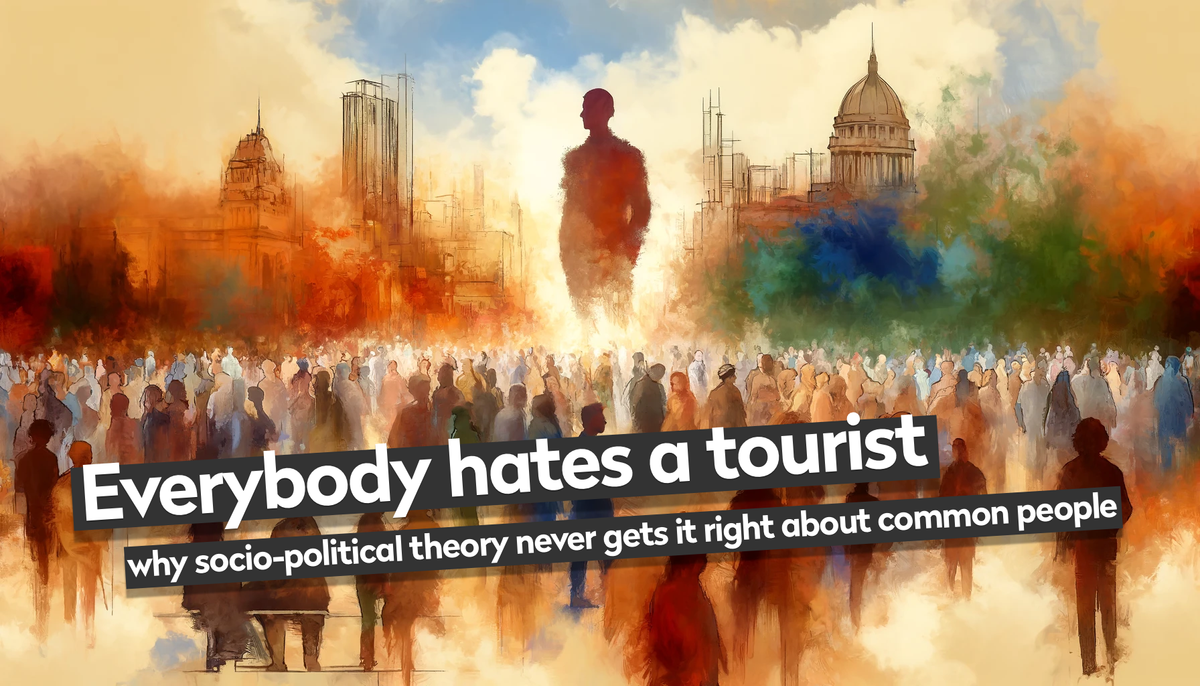
Offline References
[1] Keane, John, The Life and Death of Democracy (Simon and Schuster, 2009), 553–554.
[2] ibid., 553–554.
[3] ibid., 648–747.
[4] ibid., 571.
[5] Dyzenhaus, David, Law as Politics (Duke University Press, 1998), 181.
[6] ibid., 182.
[7] ibid., 180–182.
[8] Schmitt, Carl, Political Theology, Translated by G Schwab (MIT Press, 1986), 5.
[9] Dyzenhaus, Law as Politics, 14.
[10] Gray, John, The Immortalization Commission (Penguin, 2011), 141.
[11] ibid., 141.
[12] ibid., 7.
[13] ibid., 1.
[14] Gray, John, Straw Dogs (Farrar, Straus and Giroux, 2007), 4.
[15] ibid., 4.
[16] Morozov, Evgeny, To Save Everything, Click Here (Allen Lane, 2013), 136.
[17] Gray, The Immortalization Commission, 236.
[18] Morozov, To Save Everything, Click Here, 2.
[19] ibid., 261.
[20] Morozov, To Save Everything, Click Here, 2–3.
[21] Sandel, Michael, What Money Can't Buy (Allen Lane, 2012), 43.
[22] ibid., 44–45.
[23] ibid., 45.
[24] ibid., 46.
[25] Scheingold, Stuart A, The Politics of Rights (University of Michigan Press, 2004), 13.
[26] ibid., 14.
[27] Gray, John, Enlightenment's Wake (Routledge, 2007), 115–116.
[28] ibid., 108.


